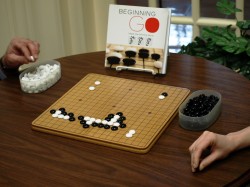by Jason Stuart, Reference Librarian
 Relax while improving you understanding of strategy by playing Go at the Library.
Relax while improving you understanding of strategy by playing Go at the Library.
Games in academic libraries… really? It seems like a topic more suited to public libraries, and some may even disagree with their place in that context. But there are times when games are appropriate in academia, and some of them may surprise you.
First though, a bit of definition of what is meant by games. This article takes the broad stance of referring to games: classic card games, social games (e.g. charades), board games, role-playing games, video games, and just about anything else one might consider a game.
Games as learning
Can games teach? Sure they can! Instead of a library tour, why not a scavenger hunt? Unlike other media, games typically put the player in the midst of dilemmas and have them actively engaged rather than passively observing. This mode of learning opens up a wealth of possibilities.
But what do they teach? Well, card and board games can be used for math and game theory. Video games can go even further, covering many subjects, such as chemistry or history. Video games also often contain the important element of narrative. Just as with books and films, video games are imbued with philosophy, culture, and a variety of beliefs and concepts just waiting for analysis by academic researchers such as psychologists and anthropologists. The narrative element in video games can be used by literature and communications students for studying story-structuring.
Games as quality of life enhancers
Playing a game allows students to have fun, interact socially, and take their minds off things; they also provide an outlet for channeling frustration and relieving stress. Unlike tests, papers, and projects, which generally permit only one or two attempts, games take pressure off the player by allowing as many attempts as necessary to achieve success.
Funding issues
Even faculty and students who agree that games have a place in academic libraries may also feel that the cost of collecting them will reduce the available funds for more important resources. So how do academic libraries typically acquire them? Well, some schools can justify the cost because they offer courses on game design or games and learning. Otherwise, grants and especially donations are common. Sometimes even student organizations devote some of their funds to purchasing games. Where there is a will, there is a way.
Further Reading
Kim, Bohyun. “Harnessing the power of game dynamics.” College & Research Libraries News 73, no. 8 (September 2012): 465-469. Education Source, EBSCOhost (http:0-search.ebscohost.com.library.regent.edulogin.aspx?direct=true&db=eue&AN=79730290&site=ehost-live)
Salter, Anastasia. “Games in the Library,” Chronicle of Higher Education, December 13, 2011. http:chronicle.comblogsprofhackergames-in-the-library37667.